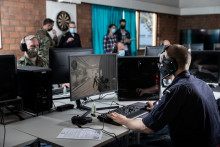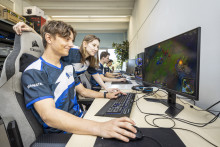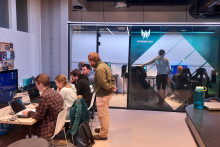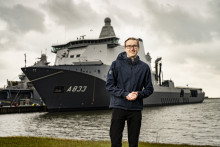How did the Royal Navy project come to life?
‘The game ‘Counter Strike Global Offensive’ (CS:GO) had a huge popularity boost last year. We are now experimenting to see how we can employ the value of esports within the Royal Navy, through this game. Many people don’t realize how much overlap there is between the interactions in esports teams and the soft skills needed in personnel, especially in regards to efficient communication and leadership skills.
The navy reached out to the UT and us, to identify opportunities to employ gaming to make better marines. We have conducted an explorative study to see how much overlap there is in skills, and because we have seen really positive results, we are currently in the process of creating a specialized workshop.’
What does that look like in practice?
‘You can imagine it as a workshop that trains people’s soft skills. Last week, we went to the navy base in Den Helder to test a first version of the workshop with some of the Navy instructors. The goal of the workshops is to create an effective and safe team environment to help each other and improve teamwork. We focus on seven skills: decision making, assertiveness, mission analysis, communication, leadership, adaptability, and situational awareness.
In the workshop, they play a round of CS:GO as a team in rounds of two minutes under high pressure. Even though the tasks might be simple, the strategies can become very complex, as they quickly need to find solutions to different situations. It was fun to see that within a matter of seconds, certain people took the lead and started giving directions. Most of them did not play CS:GO before, which shows that gaming is a lot about personal and soft skills too, not just about how much of a gamer you are.’
How can the workshop be used?
‘We want to work as closely as possible with the Navy. In our next phase, we will also test the workshop on students, and we’re thinking of a pilot across different educational levels. We would like to use it not just for the Navy but for the whole defense system, as well as firefighters and police officers.
It’s not a question of if esports happens, but when. Especially esports research is still up and coming, but the UT is already the first university in the world to investigate how to quantitatively measure and scientifically improve esports performance. We know everything about ice skating, what materials are best, what angle you need the skates to have, the best diet, sleeping schedule, you name it… Why not do the same for esports?
Is that because there still is a lot of skepticism surrounding esports?
‘There was and is definitely some convincing to do when it comes to the benefits of gaming. I hope esports will soon be internationally recognized as a sport, but the responsible policy makers are often on the older side and did not grow up with gaming like we do now. But as a manager or team leader, you just want positive results – through teamwork. And if you see positive results, it does not matter if you grew up with gaming or not.’
What would be the optimal outcome for you?
‘That esports will become a part of the Navy and that the UT is known as the gaming university in the Netherlands. Wherever teamwork is needed, people can benefit from esports. Gamers might find it easier to pick up on new systems or interfaces, and bring a lot of interesting attributes for the job market. I hope that will be recognized.’








